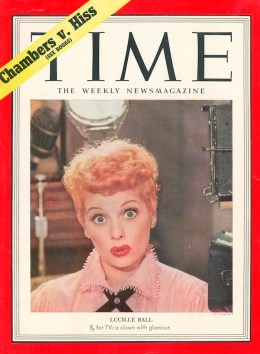
ISSUE DATE: May 26, 1952
THE BUZZ:
The television industry is not quite sure how it happened. When Lucy went on the air last October, it seemed to be just another series devoted to family comedy, not much better or much worse than Burns & Allen, The Goldbergs, The Aldrich Family or Mama. Like its competitors, Lucy holds a somewhat grotesque mirror up to middle-class life, and finds its humor in exaggerating the commonplace incidents of marriage, business and the home. Lucille’s Cuba-born husband, Desi Arnaz, is cast as the vain, easily flattered leader of an obscure rumba band. Lucille plays his ambitious wife, bubbling with elaborate and mostly ineffectual schemes to advance his career.
But what televiewers see on their screens is the sort of cheerful rowdiness that has been rare in the U.S. since the days of the silent movies’ Keystone Comedies. Lucille submits enthusiastically to being hit with pies; she falls over furniture, gets locked in home freezers, is chased by knife-wielding fanatics. Tricked out as a ballerina or a Hindu maharanee or a toothless hillbilly, she takes her assorted lumps and pratfalls with unflagging zest and good humor. Her mobile, rubbery face reflects a limitless variety of emotions, from maniacal pleasure to sepulchral gloom. Even on a flickering, pallid TV screen, her wide-set saucer eyes beam with the massed candlepower of a lighthouse on a dark night.
Read the full story here
